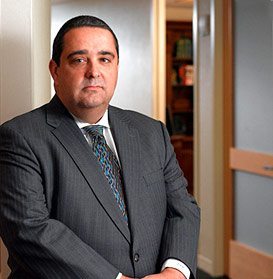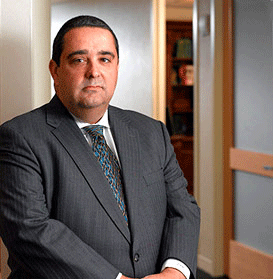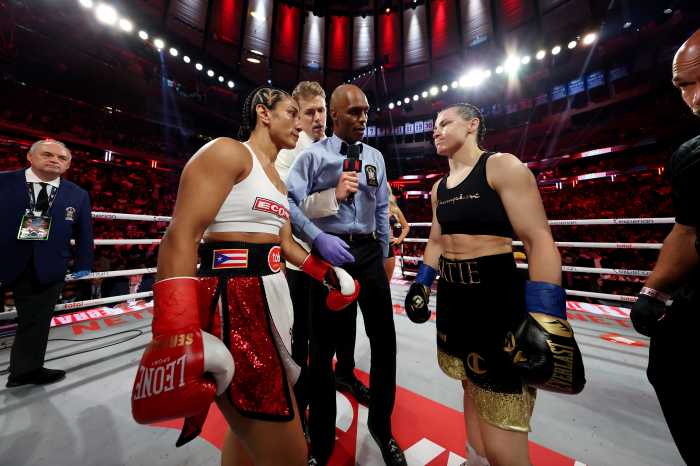 Albertson resident Paul Majkowski is now into the second decade of his recovery process from lymphoma cancer.
Albertson resident Paul Majkowski is now into the second decade of his recovery process from lymphoma cancer.
Along the way, Majkowski, in addition to his own health, has taken up the cause of helping those who are also battling the disease.
Majkowski, an attorney at Rivkin Radler LLP in Uniondale, has been a central figure in the Lymphoma Research Foundation (LRF). Since 2007, he was been involved in LRF in a variety of capacities, including president of the New York City chapter, advocacy chair of the Long Island chapter, chair of the Northeast Regional Council, while also serving as a LRF ambassador.
On Saturday, June 13, the LRF held its annual walk at Old Westbury Gardens, an event that also serves as the foundation’s main fundraiser. The “wonderful venue” was another successful event, drawing people from all around the New York City, as buses left Grand Central Station early on the morning of the event just to accommodate the enthusiastic participants.
LRF’s mission, according to Majkowski, is two-fold: To eradicate lymphoma and to conduct educational forums designed to encourage and assist those touched by the disease. In addition to the forums, LRF lobbies for federal research grants. Majkowski said that up to $56 million in such grants have been secured to fund such important research.
“As a survivor, I have an obligation to give back some of my time to engage in a mission to eradicate lymphoma,” Majkowski told The Roslyn News.
The June walk was one of the 18 such walks that took place across the United States. In a column written for Huffington Post, Majkowski spelled out his involvement.
“At the annual 5Kwalks…are signified by their yellow shirts,” he noted. “I am among the yellow shirts as a sixteen-year survivor of non-Hodgkin lymphoma. I was diagnosed at the age of twenty-nine, at which time I was one of those who did not know what lymphoma was until the day I came back from lunch to a call from my internist with the results of that morning’s routine CT scan and instructions to see an oncologist and a thoracic surgeon to biopsy the mass in my chest. After two anxious weeks of waiting for a second opinion on the pathology to determine the precise type of lymphoma, I underwent eight cycles of chemotherapy and twenty-something radiation treatments, which put me in remission.
“As chapter president [of the LRF] for five years, I had the honor of presenting welcoming remarks to the Greater New York Lymphomathon participants and each year saw the number of yellow shirts increase,” he continued. “By this increase in yellow shirts, we can see that our work has positively impacted the mission of the Foundation, which is to eradicate lymphoma and serve those touched by the disease. Indeed, since its inception in 2001, LRF has awarded more than $55 million in vital research that has led to many advances in treating the disease, and in 2012, the Foundation served more than 50,000 people through its educational programming and patient services.
“In our yellow survivor’s shirts, we find a number of meanings for each of the several constituencies we as a foundation represent and serve: for our survivors, the joy of cancer survivorship, being alive and celebrating the survivorship of others who have defeated the disease; for our current patients, the hope of successful treatment and to wear a yellow shirt the following year; and for our caregivers, the gratitude that we owe to them for the perhaps more difficult burden they bear, because unlike the patient, they are not afforded the right to have a lousy day.
“Yet, a fourth group is also represented at the Lymphomathons, those we have lost to the disease. They are not there to don the yellow shirts, we can only remember, honor and celebrate their lives with their loved ones who have come to us from the despair of their loss. For this group, the meaning of the yellow shirts lies in our continuing efforts to find a cure for this disease and impact the lymphoma community. As survivors, in exchange for our own personal stories of joy, we are obligated to work to prevent the next story of despair.
“My LRF colleagues and friends come back to the Lymphomathons each year, and will keep coming back until we see only yellow shirts; and we will continue to visit legislators for funding and vital cancer legislation; and we will continue to serve as Food and Drug Administration (FDA) patient representatives and we will continue to respond when a newly diagnosed patient emails or calls, so that they will hear from a survivor on the other end of the line,” Majkowski concluded. “We will continue working toward our shared mission to eradicate the disease and serve those touched by it, because that is what we owe as survivors.”
Paul is also involved with a new effort called the Alliance for Research Collaboration in Hematology, or ARCH, which was developed by the LRF, the Leukemia & Lymphoma Society, CancerCare, the Association of Community Cancer Centers (ACCC) and Genentech. The goal of ARCH is to directly reach lymphoma patients diagnosed and treated in community cancer programs, who may not have access to reliable information and support, and connect them to resources from the trusted partner organizations. At www.LymphomaResources.com, people can learn about the different types of lymphoma, explore treatment options, find information about specialists, and connect to patient communities, peer support programs and counseling services.



































